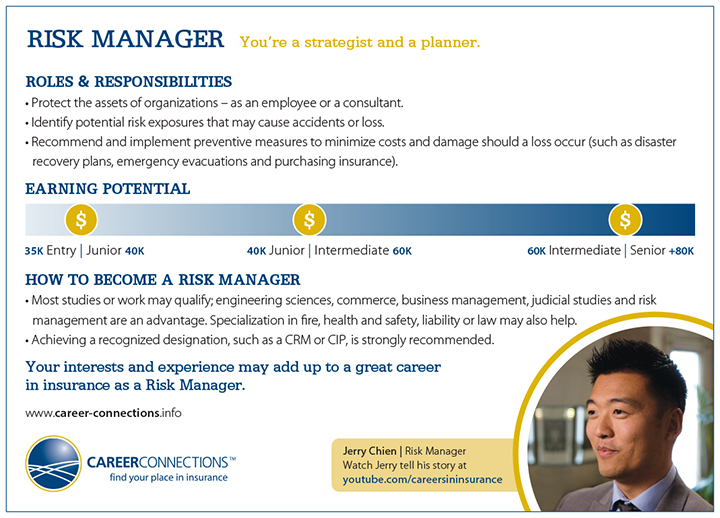Is this career for you?
The following qualifications may be required for a career as a risk manager. Do these statements describe you?
- An understanding of business administration, retail sales, and/or marketing
- Technical understanding of insurance
- Strong interpersonal and communication skills
- Self-motivated, outgoing, open-minded and open to learning
- Attention to detail and adaptable in a variety of situations
- Analytical, with excellent report writing skills
- Adept at change and project management
- Computer proficiency
If you answered yes to these statements, then a career as a risk manager might be the perfect fit!
How do I get there?
A variety of skill sets are necessary for a career as a Risk Manager. Your experience in one of the fields listed may lead you to a successful career in the insurance industry.
Manufacturing:
Your intimate knowledge of the manufacturing industry and its processes and risks, make you an excellent fit for this career. Some additional technical education may be required and an increased knowledge of the insurance basics will help you to succeed in this role. A greater understanding of insurance fundamentals will also help you to excel in this role - set a goal to take the General Insurance Education (GIE) certificate or the Chartered Insurance Professional (CIP) designation offered by the Insurance Institute while you are working in the industry.
Environmental Science:
Your experience working in the environmental science industry allows you to properly identify the environmental risks to which companies may be exposed. Your investigation and research skills suggest you are thorough and you have experience preparing and delivering reports. A greater understanding of insurance fundamentals will also help you to excel in this role - set a goal to take the General Insurance Education (GIE) certificate or the Chartered Insurance Professional (CIP) designation offered by the Insurance Institute while you are working in the industry.
Civil Engineering:
Your knowledge of planning, design and building of infrastructure, buildings and homes allows you to see the risks inherent in each. This may make you an excellent candidate for a role as a Risk Manager.A greater understanding of insurance fundamentals will also help you to excel in this role - set a goal to take the General Insurance Education (GIE) certificate or the Chartered Insurance Professional (CIP) designation offered by the Insurance Institute while you are working in the industry.
Mechanical Engineering:
You have detailed knowledge of manufacturing and can identify the risks within the operating processes, which can contribute to making you an excellent fit for a role as a Risk Manager. A greater understanding of insurance fundamentals will also help you to excel in this role - set a goal to take the General Insurance Education (GIE) certificate or the Chartered Insurance Professional (CIP) designation offered by the Insurance Institute while you are working in the industry.
Chemical Engineering:









